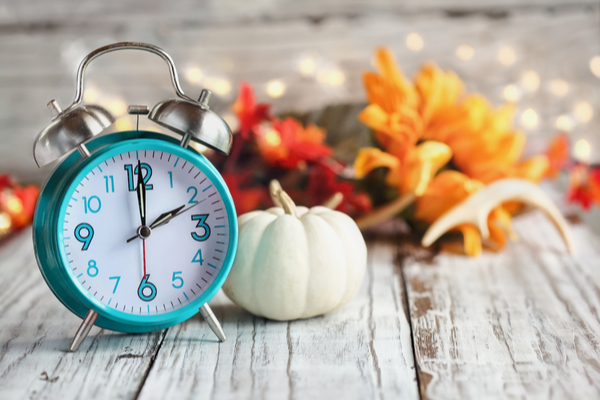Unsettling election updates from CNN. An influx of pressing work emails. 97 unread texts from your friend group chat. None of these things should be the last thing you see at night, nor the first thing you lay your eyes on in the morning. And despite this very obvious truth and the fact that excessive screen time has been linked to exacerbating just about every mental and physical health condition that besets us, smartphone addiction is a stark reality for many—if not most. And with daylight saving time newly ended, it’s crucial to acknowledge that sleeping in the same room as our smartphone, as well as using it as an alarm to wake up, is an acute part of the problem.
For starters, screen time has a direct impact on our production of melatonin, otherwise known as the hormone of darkness, which is produced in the brain’s pineal glands and requires—you guessed it—darkness to work its magic and induce sleepiness. “Melatonin doesn’t like light, especially the blue light emitted by electronics,” explains Shelby Harris, Psy.D., a behavioral sleep-medicine specialist, adding that nighttime exposure can disrupt your circadian rhythm (the body’s internal clock), which not only compromises the quantity and quality of sleep, but can also disrupt everything from the body’s digestive system to fluctuating hormonal levels.
Furthermore, no matter how you slice it, if your smartphone is plugged in next to your bed, you’re still in work or social media mode. “If you’re getting texts or email alerts, it obviously disrupts your sleep quality,” says Harris. “But even if you don’t have alerts, there’s always going to be the temptation to check your smartphone. Then, your bedroom is associated with awake activities such as work, socializing, and stress, more so than restful sleep.”
The bottom line is that if you’re keeping your phone in your bedroom, your brain isn’t fully shutting down and it’s impeding an optimal night’s rest. The solution? If you can’t rely on your circadian rhythm to wake you up naturally, revert back to a traditional alarm clock. “Go old-school!” insists Harris. “It’ll keep the temptation of your smartphone out of the room and if you put it away from your bed, you have to physically get up and turn it off, which makes the snooze alarm tougher to use.”
That said, even if you’re buying more time on a de facto alarm clock instead of an iPhone next to your pillow, it’s not a fruitful habit. “If you find that you’re constantly pushing snooze, you’re probably going to bed too late and need more sleep overall,” she says. The other factor to take into consideration if you’re having trouble getting up in the mornings, particularly during the cooler months, is light. “If you struggle with waking up early in the fall and winter because of the darkness, a dawn-simulating alarm clock can be helpful,” explains Harris.
—
Photo Credit: Stephanie Frey / Shutterstock.com
